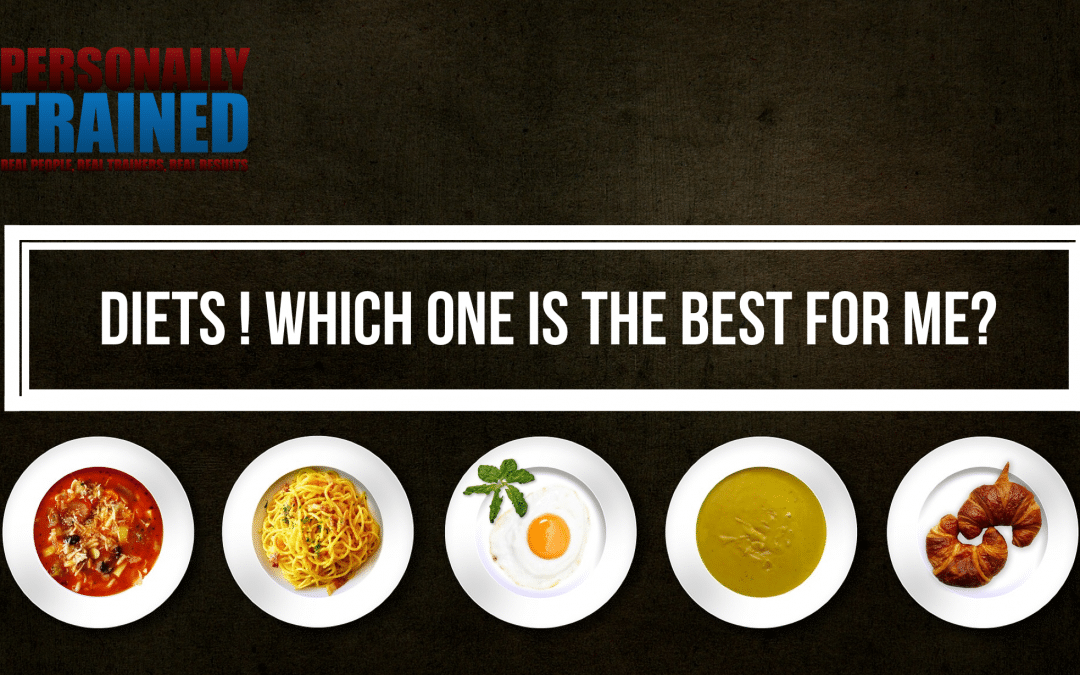Diets ? Which is the best one for me?
This is the most common question that I get asked. Which is the best one for me?
In this post I will list some of the most popular eating plans and or diets for your information. At the end of the post I will offer my opinion on them all.
Atkins diet
If people consume large amounts of refined carbohydrates, their insulin levels rise and fall rapidly. Rising insulin levels trigger the body to store energy from the food that is consumed, making it less likely that the body will use stored fat as a source of energy.
Therefore, people on the Atkins diet avoid carbohydrates but can eat as much protein and fat as they like.
The Zone diet
The Zone diet aims for a nutritional balance of 40 percent carbohydrates, 30 percent fats, and 30 percent protein in each meal. The focus is also on controlling insulin levels, which may result in more successful weight loss and body weight control than other approaches.
The Zone diet encourages the consumption of high-quality carbohydrates – unrefined carbohydrates, and fats, such as olive oil, avocado, and nut
Ketogenic diet
The ketogenic diet has been used for decades as a treatment for epilepsy and is also being explored for other uses. It involves reducing carbohydrate intake and upping fat intake. It sounds contrary to common sense, but it allows the body to burn fat as a fuel, rather than carbohydrates.
Healthy fats, such as those in avocados, coconuts, Brazil nuts, seeds, oily fish, and olive oil are liberally added to the diet to maintain an overall emphasis on fat.
The diet causes the break down of fat deposits for fuel and creates substances called ketones through a process called ketosis. This diet has risks including ketoacidosis for people with type 1 diabetes, however, and may result in diabetic coma and death. Although most studies are 2 years or less, there is some promising research in relation to diabetes management, metabolic health, weight loss, and body composition change.
Weight Watchers diet
Weight Watchers focuses on losing weight through diet, exercise, and a support network.
Weight Watchers Inc. was started in the 1960s by a homemaker who had lost some weight and was concerned she might put it back on. So, she created a network of friends. Weight Watchers is a huge company, with branches all over the world.
Dieters can join either physically and attend regular meetings, or online. In both cases, there is lots of support and education available for the dieter.
South Beach diet
The South Beach diet was started by a cardiologist, Dr. Agatston, and a nutritionist, Marie Almon. It focuses on the control of insulin levels, and the benefits of unrefined slow carbohydrates versus fast carbohydrates. Dr. Agatston devised the South Beach diet during the 1990s because he was disappointed with the low-fat, high-carb diet backed by the American Heart Association. He believed that low-fat regimes were not effective over the long-term.
Mediterranean diet
The Mediterranean diet is Southern European, and more specifically focuses on the nutritional habits of the people of Crete, Greece, and southern Italy. Nowadays, Spain, southern France, and Portugal are also included, even though Portugal does not touch the Mediterranean Sea.
The emphasis is on lots of plant foods, fresh fruits as dessert, beans, nuts, whole grains, seeds, olive oil as the main source of dietary fats. Cheese and yogurts are the main dairy foods. The diet also includes moderate amounts of fish and poultry, up to about four eggs per week, small amounts of red meat, and low to moderate amounts of wine.
Up to one-third of the Mediterranean diet consists of fat, with saturated fats not exceeding 8 percent of calorie intake. The Mediterranean diet is the most extensively studied diet to date, with reliable research supporting its use for improving a person’s quality of life and lowering disease risk.
Paleo diet
The Paleolithic diet, or caveman diet, a weight-loss craze in which people emulate the diet of plants and animals eaten by early humans during the Stone Age
As you can see there are a lot to chose from and these are only a sample of the most popular. Each diet does have its successes but they don’t all work for everyone. Im not a fan of deprivation diets or ones that makes thing overly complicated.
My advice (purely advice that comes from my experience on my own weight loss journey – you can read it here <My Story>. Eat more natural foods (not processed) and move more. When I was on my own weight loss journey I made my diet as simple as possible without any frills. I kept a food diary for a month to see what my relationship with food was like. Then took those results and made a nutrition plan that helped me move the unwanted kgs. Without following a nutrition plan I would not have achieved the results I did in the time it took. I believe it would have taken a lot longer. My plan consisted of eating meat, fish, chicken, plenty of vegetables and fruit. To this day my diet is pretty much the same but I do make adjustments based on my work load.
For all my clients whether they are part of our one to one personal training, group training or online personal training we offer nutritional advice in their programs.
